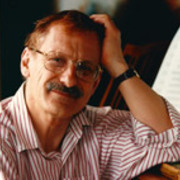
Jack Body
Jack Body’s immersion in music involved time in Holland, Germany and his beloved Indonesia, and excursions into choirs, electronic music, and gamelan orchestra. During 30 years lecturing music at Victoria University he keenly promoted music from the Asia-Pacific, establishing a residency for overseas musicians to work with staff and students. Body’s long musical journey also included a variety of compositions for the screen, from the evocative score of Vincent Ward classic Vigil to 1974's Ueneku, the first television drama in te reo.
Born in the Waikato town of Te Aroha, Body grew up in a house with no record player. At eight he began learning piano; by 11 he was playing his compositions at concerts run by his music teacher. By his third year of studying music (with first class honours) at Auckland University, Body was organist and choirmaster at a Remuera church.
After time at Douglas Lilburn’s electronic music studio in Wellington, Body won a QE2 Arts Council grant to study in Europe. In Cologne he took a course run by composer Mauricio Kagel and helped make “a collective experimental video of short sequences of varied music-theatre, joined together in an apparently arbitrary juxtaposition”. When Kagel finally turned up he loved it.
Time in Utrecht, and various travels across Asia provided further inspiration. In the mid 70s Body helped Victoria University lecturer Allan Thomas bring a set of gamelan instruments back from Indonesia (Body talked gamelan in this 10am magazine item).
The early 70s marked the beginning of an especially busy period of composing, some of it for the screen. In 1973 Body composed the music for Feltex award-winning drama Richard John Seddon - Premier. The following year he got busy on depression-era TV series The Longest Winter, and sequences in this doco of artist Ralph Hotere at work. 1974 also saw the screening of Uenuku, the first television drama broadcast entirely in te reo. Geoff Murphy directed this stylish adaptation of the Māori legend.
Soap opera Close to Home debuted in 1975 and would remain on air for eight years, allowing Body’s opening theme plenty of time to worm its way into people’s heads.
In 1976 he began a two year stint as guest lecturer at a music academy in the Indonesian city (and artistic hotbed) of Yogyakarta. “My experiences there have profoundly affected the way I think and feel about life and music,” Body later said. “It has given me a taste of another world of sensibility and awareness and made me understand that all knowledge and understanding is only relative.”
Body’s time in Indonesia made him freshly aware of the distinctive sounds found in each place. Bells were attached to oxen, making it possible to hear whether a cart was loaded or empty. Street hawkers and street musicians would inspire a number of works. 1975’s Music Dari Jalan won him the first of three prizes at France’s International Festival of Electro-accoustic Music.
Body’s experiences in Asia were part of the musical melting pot that fed into the imaginative Blackhearted Barney Blackfoot. The tale of two children and scary stepfather told its story through sound and picture, instead of dialogue. Part funded by the Department of Education and screened in NZ schools (as well as television), the short was designed so that children could watch it a second time without music, allowing them to add their own instruments.
In 1984 Body composed the score for his first feature film, Vincent Ward classic Vigil. Earlier Body had worked on the soundscapes for Ward’s documentary In Spring One Plants Alone; the new film became the first NZ feature to compete at the Cannes Film Festival. Again this painterly, evocative portrait of a young girl on an isolated farm worked largely through image and sound. Body’s score utilised synthesisers, strings and snatches of human voice. Variety scribe Mike Nicolaidi praised Body’s work, “which never overpowers but blends subtly with sound effects and images”.
Body would join composer John Gibson for a further Ward title. Rain of the Children imagines the decade-spanning history of the elderly Māori woman Ward encountered while making In Spring One Plants Alone. The score won best soundtrack in the 2008 Qantas Awards.
Body’s eclectic career went in many other directions from film. His work has also encompassed sound-image installations in art galleries, four works for the Kronos Quartet, plus Alley, an opera about Rewi Alley which debuted at the 1998 International Festival of the Arts. His music was showcased at festivals in San Francisco, Buenos Aires, Indonesia and Cambodia. Album Pulse (2002) won the NZ Music Award for Best Classical CD. During a 32 year long run as editor of Waiteata Music Press, he published scores of scores by NZ composers.
He also helped organise and programme many festivals, starting with a series of Sonic Circuses in the 60s: 12-hour multi-venue music marathons featuring local music. Later he organised three Asia Pacific Festivals and a five-concert fest of New Zealand music in Amsterdam. In 2000 he marked 25 years of gamelan in New Zealand by helping organise BEAT, an International Gamelan Festival with 100 plus overseas participants.
In 2001 Jack Body was honoured with a New Zealand Order of Merit for his services to music, education and photography; three years later the Arts Foundation made him an Arts Laureate, and shortly before his death, became the first laureate to also be named an Arts Foundation Icon.
Jack Body passed away on 10 May 2015, after a long battle with cancer.
Profile written by Ian Pryor; updated on 15 May 2015
Sources include
Jack Body website (broken link)
'Jack Body' Sounz website
. Accessed 15 May 2015
'Jack Body - Composer' The Arts Foundation website. Accessed 15 May 2015
Mike Nicolaidi, Review of Vigil - Variety, 2 May 1984
Sarah Schieff, Talking Music: Conversations with New Zealand Musicians (Auckland University Press, 2001)
John M Thomson, Biographical Dictionary of New Zealand Composers (Wellington: Victoria University Press, 1990)